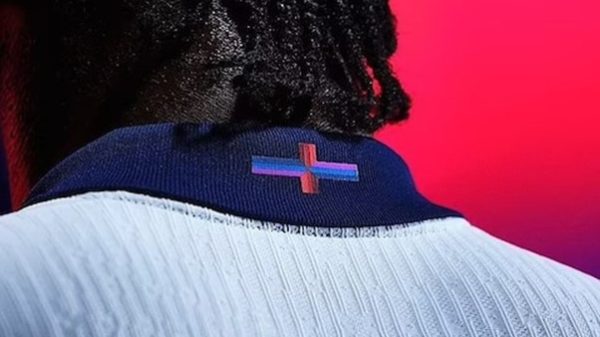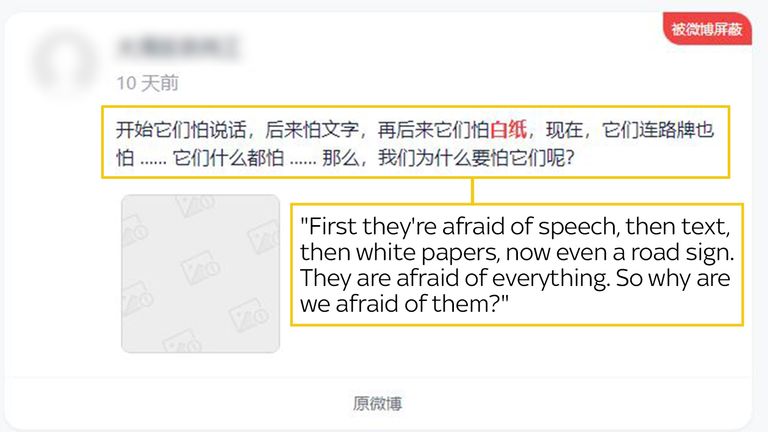One of the country’s most popular social media platforms has censored a number of posts calling for people to not be intimidated and harassed by Chinese authorities.
Sky News has been monitoring posts that were removed from Weibo ever since the largest protests in decades brokeout across the at the end of November.
Weibo makes it clear on its platform that they monitor content and can remove it.
Although it is impossible to determine the true extent of and how many posts they take down postings, one online tool allows you to collect and restore Weibo messages that were blocked to counter social media censorship.
“First, they are afraid of speech, then text and finally white papers. Now, even a road sign. They fear everything. “So why are they afraid of them?” reads one typical banned post, which has been resurfaced at freeweibo.org.
This message was published following the third night protests against China’s harsh zero- COVIDmeasures. It was one of many posts asking people to challenge authorities.
Police were confronting protesters holding white paper pieces. Officers removed a street sign for Urumqi Road, one of Shanghai’s main rally spots.
After the demonstrations, the country’s coronavirus regulations were relaxed through an sudden change policy.
Residents continue to resist the authorities by deleting social media posts.
One man from Zhejiang (a province close to Shanghai) participated in an online demand for the release of those who were arrested during the protests.
He wrote “let them get home” in a December post, about a week after restrictions started to ease. He also shared a Weibo post by another user that said: “It is time to call for the release of the protesters!”
“Thanks to these young men we can freely go out of our home and don’t need to be transported into the cabin hospitals!”
Some of the posts that were removed over the past few days include the story of a Beijing man who was confronted by police for his social media comments.
“[My text] caught authorities’ attention. They knocked on my door at night, and arrested me for the crime ‘fabricating facts and disturbing social order’.
They recorded me saying the same thing over and over again, and then called my compound administration office and the checkpoint that I had mentioned in the text. Because I didn’t lie, I am not afraid.
“But horribly,” they said. They took my phone away from me after I left my house so I couldn’t call anyone. They forced me to enter my password for my phone.
The anger of the Chinese public against the zero COVID policy may have flared up suddenly, possibly due to fears that the restrictions might have led to the deaths of many people in a fire at a Chinese building.
Data gathered by the Armed Conflict Location & Event Data Project, (ACLED), shows that discontent in the country has been growing steadily.
ACLED has been keeping track of protests regarding COVID since the outbreak. Although the data is up to 30 November this year, it is not complete. It does not include protests at 50 universities. It is constrained by restrictions on information about protests in China.
ACLED recorded the first coronavirus-related protests in China on January 28, 2020. This was when hundreds of Shanxi taxi drivers protested the loss of business caused by the outbreak.
Similar protests were seen in the first four months of this year, mostly over concerns about salaries and food access during coronavirus lockdowns. The protests over COVID-19 largely stopped after that until April 2022.
This year’s spring surge led to headlines reporting on areas in China that were close to “civil disorder”.
We can expect a variety of protests throughout 2022 from that point forward.
This data allows us to see where protests are occurring geographically. There have been demonstrations all over the country.
In apparent response to these protests across the country, 1 December saw the start of a rapid rollout reductions in COVID restrictions.
This dramatic shift has raised new concerns. Chinese social media users have shared their worries about panic buying coronavirus medication and commented on their symptoms of sore throats online.
Some believe that the rising COVID rates in China is a result to the change in policy, but WHO emergency director Mike Ryan stated that infections have been increasing since before. On Thursday, he stated that the disease was rapidly spreading because he believed the control measures were not enough to stop the spread of the disease.
Sky News spoke with Manya Koetse who is the founder of Weibo monitoring website whatsonweibo.com: “There are many mixed emotions noticeable among social media users.
“China is moving from one extreme to another, with some jokes that it’s not about zero positive COVID [nobody has the virus], but about zero negative CoVID [everyone gets it].”
Ms. Koetse claims that she has witnessed social media users from small towns like Baoding or Dazhou complain about their fevers and the fact that local facilities are not equipped to handle them, leading to overflow at local clinics.
She has seen social media chatter in larger cities like Beijing and Wuhan arguing about whether people should go to the hospital even though their symptoms may be mild.
The
Data and Forensics
team is a multi-skilled unit dedicated to providing transparent journalism from Sky News. We gather, analyse and visualise data to tell data-driven stories. We combine traditional reporting skills with advanced analysis of satellite images, social media and other open source information. Through multimedia storytelling we aim to better explain the world while also showing how our journalism is done.






















